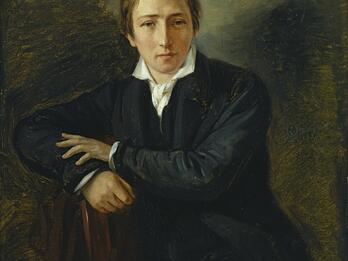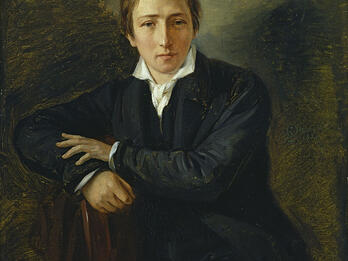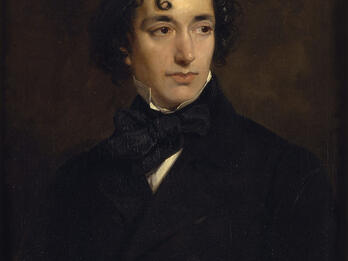Sihah be-erets ha-hayim (A Conversation in the Afterlife)
A dialogue in the land of the living between our teacher, R. Moses Maimonides, the Spaniard, and our Teacher Moses, son of Menaḥem [Mendelssohn] of Dessau, and an anonymous third person.
On the day of arrival of the soul of our Master, our Teacher Moses, son of Menaḥem, of Dessau, in the land of the living.
[A large and spacious area, all around which are planted all types of fruit-bearing trees of desirable appearance and good for food, and beneath their shade, many souls are seated to amuse and enjoy themselves. Moses Maimonides is walking along, when, lo and behold, a certain individual runs toward him and stands opposite him.]
Moses! Moses! Please stop and listen to what I . . .
For how long will you behave aggressively toward me? Have I not already told you two or three times “Leave me alone”? See over there, beneath the verdant oak-trees, there is a band of men sitting and enjoying themselves in an affectionate manner; go there, I beg you, if you desire to develop friendships, but leave me alone and let me go on my way.
Do not let your anger be kindled against me, and allow me to speak just this once! Are you that man, Moses, whose name is renowned still today amongst Judah and Israel? Are you the man in regard to whom those dwelling on earth declare: “From Moses unto Moses, no one has arisen like unto Moses”? I trust that my words bespeak only goodness and mercy; I had hoped to see your face as one sees the face of God, and now I have seen you as a human being, as one of us—is this what is called “the path of holiness”—to pour scorn on a man before having enquired into and examined his inner thoughts? Do you possess the eyes of the Almighty to perceive what is within my heart, in that you have shut your ears to my words? What have I done to you and how have I wearied you? Testify against me!
You are correct! I am indeed not God to be able to penetrate the imaginings of your heart, but I have eyes to see to what sort of people you belong. I know the men of your place of origin and your birthplace—I know them well, for they are children lacking in faith and without any decent order in their laws and their deeds; moreover, they have not trained their tongues to speak with rectitude and with purity, as is appropriate. My soul was fully sated with sorrow on each occasion when I was here amid their assemblies. And I have accordingly made a covenant with myself these many days to store myself away from this generation for eternity! [ . . . ]
If that is the case, why do we need to go to the end of my work to speak about matters existent in former times that have now passed away? Let us go to the beginning of my work to hear what you have to say, with words remaining constant forever—speak, I beg you! Look, I stated in the section “Halakhot relating to Opinions and Beliefs”: “Anyone saying that the Creator, blessed be He, has a body and a material form is a heretic”; and I heard that, after its publication, there arose an individual who became my intellectual opponent, a certain Abraham, son of David, whom you have mentioned, and who said as follows: “Why has he called such a person a heretic? Were there not men greater and better than he who held this belief?” Now tell me, I pray you, what is your view on this? How can a single man have the audacity to harbor thoughts of such a vile nature as this, and to affirm two opposites in relation to the identical theme? For if the Creator has a body, He is also blended and conjoined from various different parts; and if He is conjoined from different parts, He would also necessarily be something novel, for prior to His blending, He was not what He is now, and He would also, by this token, be existent within space and time—and what man of intelligence could conceivably believe something like that?
[to himself ]: Conjoined, novel, existent in space!—My ears are hearing novel and bizarre things; I do not understand a single word that he has spoken! Is he philosophizing? Moses! How you have changed your tune! Look, I came to you to give you to drink of the spiced wine of Torah, with words both sweet and pleasant, and you revert with words of a trivial nature, the knowledge of which will neither benefit nor add anything to you. I swear by my life, in a little while he will also be asking me questions based upon his work The Guide to the Perplexed! What shall I do?
Why are you silent and do not open your mouth? Do you too believe what my intellectual opponent says, that the Creator has a body and a material form?
Heaven forbid that I should believe something like that, which lacks the light of reason!
But why? How have you refuted his arguments? And from where have you adduced proof against him?
Proof? Is not the negation of material form within the Creator, blessed be He, readily apparent from the Torah of Moses our Teacher, for there it is stated that the Lord is a consuming fire?
[laughing]: But what you have adduced as a proof actually refutes your words rather than supporting them, for this verse too materializes the Creator, blessed be He, by describing Him as “a consuming fire”; whereas in reality, our Master, Moses, said this merely as a figure of speech; for fire is a lofty substance, pure and elevated above all the other elements, and anyone daring to approach it will not escape unscathed; the Lord your God is comparable to this metaphorical image—a zealous God, Who will not acquit anyone who rebels against His words or transgresses His covenant. And had our Master, Moses, spoken only in the presence of sages and men of discernment, he would have depicted the Creator, blessed be He, through the employment of lofty metaphors, far removed from any traces of materiality; but as it was, he was speaking in the presence of the masses, whose hearts were “plastered over” in such manner as to impede their comprehension of elevated notions—hence he employed a physical description.
[to himself ]: By my life, he is philosophizing; how cast down is my soul and how it moans within me!
Now what if we were to say that what is absent here in the verse is the letter kaph, denoting comparison, as is the custom of scripture on frequent occasions, in which case the verse, in its perfected form, would read: “For the Lord your God is like a consuming fire”?
[to himself ]: He comes to challenge me with grammar too! I can no longer hold my peace; no longer will I place a bridle on my mouth, come what may, but I will speak in accordance with whatever is in my heart, for zeal for the Lord of Hosts and His holy Torah is fueling this! [To Maim, in a spirit of pride]: I am neither a philosopher nor the son of a philosopher, but rather, I have meditated upon the Torah of the Almighty, and have constantly been attracted to it, and when I stated that I have studied your work from start to finish, I meant only as regards those matters as are of the greatest importance, such as the laws concerning the sacrifices of birds and the purification of menstruating women, or laws relating to sacred objects and monetary matters and the like, so as to enable me to provide guidance as between plea and plea and as between blood and blood. So of what interest to me are those things which you have asked me? What will I gain by knowing them and what will I lose by not knowing them? Accordingly, I have not studied the halakhot relating to theological beliefs and opinions at all!
[to himself ]: It is exactly as I said: I yearn for pride such as this to be manifested within Jacob! Now he has unveiled the mask from himself and has appeared before me as naked as when he came forth from his mother’s womb! But now, what shall I do? Shall I leave him and proceed on my way? Will he then not remain entrenched in his false opinions—no! For the honor of the Almighty, I shall hold myself back from acting thus, and direct him as to the way on which he should go; perhaps his heart will understand, and he will return and be healed! [To Anon]: Was it for nothing that I placed the halakhot relating to theological opinions and beliefs at the beginning of my work? Was it not through this means that I demonstrated to people, that they might realize that this theme emerges promptly, at first instance, to greet anyone desirous of studying my work, and that without it, he cannot penetrate into the interior of my work. And in similar vein, our Sages of the Talmud have declared: “Any Talmudic scholar who is deficient in theological knowledge, a carcass is better than he!”
I am not unaware of this Talmudic dictum, and the sages and Torah scholars of my own era have already explained it well, when they stated that the meaning of this statement is: any Talmudic scholar who is lacking in knowledge, that is to say, lacking in the fear of the Almighty included within it, to appreciate his own lowliness, such an individual is worse than a carcass, because, in regard to a carcass, wherever it is thrown and laid to rest on the surface of the dung, everyone will maintain his distance from it so as to avoid having to walk around it; and thus it will never, in any event, constitute a stumbling-block to human beings. This is, however, not the case in regard to a Talmudic scholar who is lacking in knowledge—such a person will be loathsome and will accustom others to conduct themselves in ways that are not beneficial, and hence he will be the cause of stumbling on the part of other human beings who neither see nor know him.—And blessed be God, Who inclined his lovingkindness toward me to make me worthy of possessing knowledge, for I know how low is my worth, and my spirit has never raised me up to ascend to the heights with lofty philosophical explorations, but on the contrary, I have been wholehearted with the Lord my God!
Translated by
.
Credits
Aaron Halle-Wolfsohn, "Sihah be-erets ha-hayim (A Conversation in the Afterlife)" (Play, Berlin,1794–1797). Published in: Yehuda Friedlander, Peraḳim ba-saṭirah ha-ʻIvrit = Studies in Hebrew satire, v. 1. Be-shalhe ha-meʼah ha-18 be-Germanyah, 3 vols. (Tel-Aviv: Papirus, 1979), 54-55 146, 151-153.
Published in: The Posen Library of Jewish Culture and Civilization, vol. 6.





